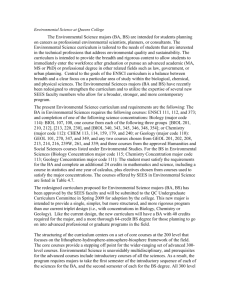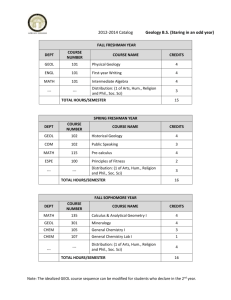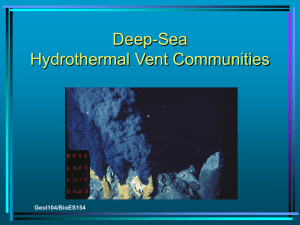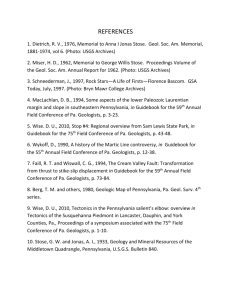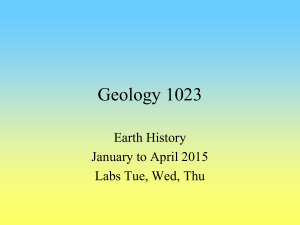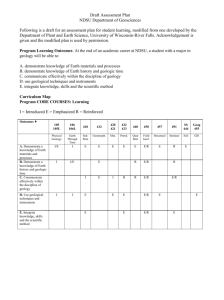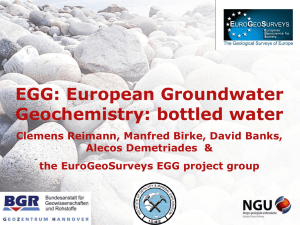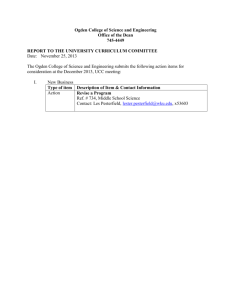GEOL 201 Physical Geology
advertisement
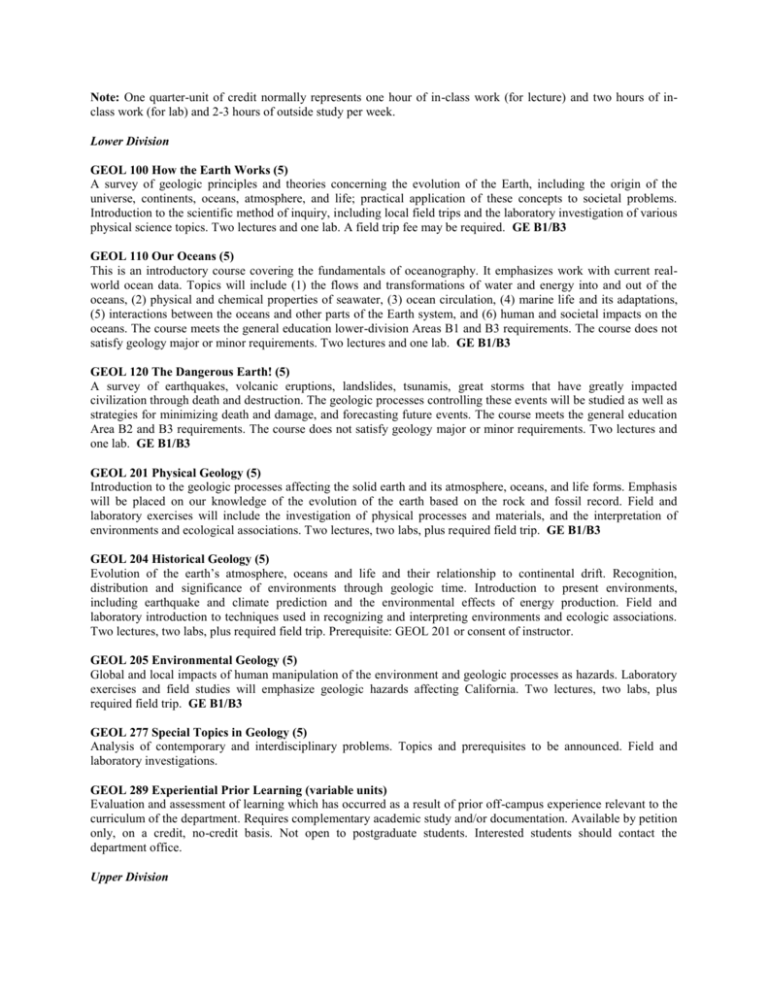
Note: One quarter-unit of credit normally represents one hour of in-class work (for lecture) and two hours of inclass work (for lab) and 2-3 hours of outside study per week. Lower Division GEOL 100 How the Earth Works (5) A survey of geologic principles and theories concerning the evolution of the Earth, including the origin of the universe, continents, oceans, atmosphere, and life; practical application of these concepts to societal problems. Introduction to the scientific method of inquiry, including local field trips and the laboratory investigation of various physical science topics. Two lectures and one lab. A field trip fee may be required. GE B1/B3 GEOL 110 Our Oceans (5) This is an introductory course covering the fundamentals of oceanography. It emphasizes work with current realworld ocean data. Topics will include (1) the flows and transformations of water and energy into and out of the oceans, (2) physical and chemical properties of seawater, (3) ocean circulation, (4) marine life and its adaptations, (5) interactions between the oceans and other parts of the Earth system, and (6) human and societal impacts on the oceans. The course meets the general education lower-division Areas B1 and B3 requirements. The course does not satisfy geology major or minor requirements. Two lectures and one lab. GE B1/B3 GEOL 120 The Dangerous Earth! (5) A survey of earthquakes, volcanic eruptions, landslides, tsunamis, great storms that have greatly impacted civilization through death and destruction. The geologic processes controlling these events will be studied as well as strategies for minimizing death and damage, and forecasting future events. The course meets the general education Area B2 and B3 requirements. The course does not satisfy geology major or minor requirements. Two lectures and one lab. GE B1/B3 GEOL 201 Physical Geology (5) Introduction to the geologic processes affecting the solid earth and its atmosphere, oceans, and life forms. Emphasis will be placed on our knowledge of the evolution of the earth based on the rock and fossil record. Field and laboratory exercises will include the investigation of physical processes and materials, and the interpretation of environments and ecological associations. Two lectures, two labs, plus required field trip. GE B1/B3 GEOL 204 Historical Geology (5) Evolution of the earth’s atmosphere, oceans and life and their relationship to continental drift. Recognition, distribution and significance of environments through geologic time. Introduction to present environments, including earthquake and climate prediction and the environmental effects of energy production. Field and laboratory introduction to techniques used in recognizing and interpreting environments and ecologic associations. Two lectures, two labs, plus required field trip. Prerequisite: GEOL 201 or consent of instructor. GEOL 205 Environmental Geology (5) Global and local impacts of human manipulation of the environment and geologic processes as hazards. Laboratory exercises and field studies will emphasize geologic hazards affecting California. Two lectures, two labs, plus required field trip. GE B1/B3 GEOL 277 Special Topics in Geology (5) Analysis of contemporary and interdisciplinary problems. Topics and prerequisites to be announced. Field and laboratory investigations. GEOL 289 Experiential Prior Learning (variable units) Evaluation and assessment of learning which has occurred as a result of prior off-campus experience relevant to the curriculum of the department. Requires complementary academic study and/or documentation. Available by petition only, on a credit, no-credit basis. Not open to postgraduate students. Interested students should contact the department office. Upper Division Note: All upper division courses include two lectures and two labs per week, plus required field trip unless otherwise designated. GEOL 303 Mineralogy (5) Origin and formation of minerals in the earth’s crust. Laboratory and field investigation of physical (x-ray included), chemical, and optical properties of minerals and mineral deposits. Laboratory and field projects. Co-requisites: CHEM 101 or 211, 211L and GEOL 100, 201, or 205 or consent of the instructor. GEOL 305 Paleobiology (5) Origin and evolution of the biosphere. Emphasis on invertebrate comparative morphology, paleoecology, environmental evolution and catastrophic events. Laboratory and field techniques will apply analytical, statistical and computer applications in the interpretation and modeling of morphologic structure and variation, paleoecologic associations and evolutionary sequences. Prerequisite: GEOL 100 or 201 or 205. GEOL 306 Petrology and Petrography (5) Origin, formation, and classification of igneous, sedimentary, and metamorphic rocks, emphasizing field identification. Spatial, physiochemical, thermodynamic, and petrographic properties of natural earth materials. Field and laboratory investigation and presentation. Prerequisite: GEOL 303. GEOL 307 Structural Geology (5) Reactions of the earth’s crust and surface to internal stresses; folding and faulting; origins of stresses; mountain building. Field and laboratory investigation and presentation. Prerequisites: GEOL 201, MATH 192 (or permission of the instructor) and PHYS 201 or 221. GEOL 308 Geomorphology (5) Origin of the topography of the continents, with emphasis on the recent evolution of the present land forms and the implications for man. Field and laboratory investigation and presentation. Prerequisite: GEOL 100 or 201 or 205 or consent of instructor. GEOL 309 Sedimentation and Stratigraphy (5) Topics include stratigraphic analysis, environmental reconstruction of stratigraphic sequences, and facies relationships and correlation. Also, the interpretation of modern and ancient sedimentary environments will be studied. Focus will be on sedimentologic and stratigraphic field and laboratory techniques emphasizing the Cenozoic sediments of southern California. Prerequisite: GEOL 100, 201, or 205. GEOL 310 Geochemistry (5) Distribution of elements within the earth, their mobilities and interactions during crustal processes. Methods of investigation, application to geologic and environmental studies and petroleum and minerals exploration. Field and laboratory investigation and presentation. Prerequisites: CHEM 212, 212L, and one of GEOL 303 or CHEM 320 or 351. Some skills from the second quarter of calculus will be applied in this class. It is recommended that students complete MATH 202 or 212 prior to enrollment or expect to acquire the necessary skills independently. GEOL 325 Principles of Exploration Geophysics (5) Introduction to applied geophysical methods including reflection and refraction seismology, gravity, magnetics, electrical resistivity, and electromagnetics. In addition to learning the principles behind each method, students will collect, process, and analyze geophysical data. Co-requisite: PHYS 202 or 222 or permission of the instructor. GEOL 330 Geology of the National Parks (5) Physical and historical geology of selected national parks and monuments, with emphasis on California. Development of an understanding of the potential use of scientific data and knowledge in making land use decisions. Laboratory emphasis on map and photo interpretation. Two lectures, one lab, plus required field trip. Prerequisite: GEOL 100 or 201 or 205 or equivalent, or consent of instructor. GEOL 420 Environmental Geochemistry (5) Processes that influence the behavior of trace metals and nutrient elements in natural waters, soils, and sediments and control the chemical composition of pristine and polluted surface and groundwater. Topics will include a review of pertinent thermodynamic principles, acid-base equilibria, chemistry of dissolved CO2, metal complexation, precipitation and dissolution of solids, adsorption, and redox reactions. Prerequisites: CHEM 212, 212L, GEOL 310, or consent of instructor. GEOL 450 GIS for Natural Sciences (5) This course introduces students to the basic functionality of GIS software. Skills to be covered include querying, editing attribute tables, analyzing spatial relationships, working with grid datasets, creating your own data and display techniques including layouts and 3D scenes. Students will also learn to download and convert some common spatial data formats available on the web. Prerequisite: familiarity with Windows operating system and 20 credit hours of upper division coursework in a scientific discipline or permission of instructor. GEOL 460 Petroleum Geology (5) Origin, migration and entrapment of hydrocarbons. Exploration methods including sampling and wireline logs, core evaluation, formation testing, seismic methods, log correlations, map construction and interpretations. Prerequisites: GEOL 201, 307, and 309. GEOL 475 Hydrogeology (5) Topics will include water budgets, development of the equations of groundwater flow, well mechanics, aquifer properties and impact of groundwater development on aquifers, pump tests and their interpretation, and modeling aquifer response. Course will include local examples in laboratory exercises. Prerequisites: GEOL 100 or 201 and MATH 191 or consent of instructor. GEOL 477 Special Topics in Geology (1-5) Topics and prerequisites to be announced. May be repeated for different topics. These will include from time to time such subjects as: geology of petroleum; oceanography; advanced environmental geology; soils geochemistry; hydrology; paleobiology; and paleoecology. Specific areas designated when offered, and prerequisites listed depending on the specific areas. A field trip fee may be required. GEOL 480 Research Participation (1-5) Individual study, under supervision, in scientific investigation. (Experience as a research assistant does not count for credit.) May include research in the areas of curriculum and materials development. May be repeated. Prerequisite: 30 units in Geology and consent of instructor. GEOL 489 Experiential Prior Learning (variable units) Evaluation and assessment of learning which has occurred as a result of prior off-campus experience relevant to the curriculum of the department. Requires complementary academic study and/or documentation. Available by petition only, on a credit, no-credit basis. Not open to postgraduate students. Interested students should contact the department office. GEOL 490 Senior Field Seminar (5) Investigation of geologic problems. Students will be required to demonstrate proficiency in field methodologies and library research, apply laboratory methods to field investigation, and report on their results. One lecture per week and multiple two-day, weekend field trips. Prerequisites: GEOL 303, 306, 307, and 309 or permission of the instructor. GEOL 495 Field Course in Geology (5) Fundamentals of surveying and mapping and methods of field investigation in geology. An approved summer field course may be used to satisfy the field course requirement, and is strongly recommended. Prerequisites: MATH 192 and 20 units in Geology (including GEOL 201). A field trip fee may be required. GEOL 495 is generally taken during the Summer following the senior year. GEOL 496 Internship in Geology (1-5) Internships may be arranged by the department with various agencies, businesses, or industries. The assignments and coordination of work projects with conferences and readings, as well as course credits, evaluation, and grading, is the responsibility of the faculty liaison (or course instructor) working with the field supervisor. Offered on a credit, no-credit basis only. Department will determine credits and application of credit. GEOL 497 Cooperative Education (1-5) The Cooperative Education program offers a sponsored learning experience in a work setting, integrated with a field analysis seminar. The field experience is contracted by the Cooperative Education office on an individual basis, subject to approval by the department. The field experience, including the seminar and reading assignments, is supervised by the cooperative education coordinator and the faculty liaison (or course instructor), working with the field supervisor. Students are expected to enroll in the course for at least two quarters. The determination of course credits, evaluation, and grading are the responsibility of the departmental faculty. Offered on a credit, no-credit basis only. Department will determine application of credit. Graduate Courses GEOL 515 Paleoclimate of Western North America (5) Fundamentals of the earth’s climate and a survey of the geologic record of climate change focusing temporally on the past 70 million years and spatially on western North America. Topics will include the processes behind the earth’s climate system and its dynamic nature, the Monterey (Fm) Hypothesis, glacial/interglacial swings in the Quaternary Period, interactions between the climate, geological processes, humans, and the biosphere during the late Quaternary. Lectures will be supplemented by laboratory and field study. Two lectures, two labs, plus required field trip. Prerequisites: GEOL 201 or equivalent, two quarters of college-level chemistry and physics, and at least 20 units of upper division coursework in Geology, Chemistry, Physics, Biology, or Physical Anthropology. GEOL 525 Applied Hydrogeochemistry (5) After a review of the pertinent principles of aquatic geochemistry, this course focuses on the practical application of these principles to groundwater issues. Topics include water sampling protocol, graphical and statistical methods for the interpretation of hydrogeochemical data, composition and evolution of natural waters, and environmental issues such as mobility of metals in the subsurface, acid mine drainage, and risk assessment and clean-up at hazardous waste sites. Throughout the course, the geochemical speciation model MINTEQA2 will be used to model the composition of pristine and contaminated waters. Two lectures, two labs, plus required field trip. Prerequisite: GEOL 420, 475, or consent of instructor. GEOL 555 Contaminant Hydrogeology (5) Course will provide an understanding of the processes that govern the mobility and fate of contaminants in subsurface environments and of the methods that are used to remediate contaminated sites. Topics include a review of the equations describing the flow of groundwater and the transport of contaminants in groundwater, processes that control the transport and transformation of contaminants in the saturated zone and the vadose zone, multiphase flow, reactions of organic and inorganic contaminants, soil and groundwater sampling, and remediation technology for contaminated soils and groundwater. Two lectures, two labs, plus required field trip. Prerequisites: GEOL 420, 475, or consent of instructor. GEOL 570 Oil Field Development (5) Formation evaluation and testing, production methods, water drive, methods of enhanced oil recovery. Two lectures, two labs, plus required field trip. Prerequisites: GEOL 460 or permission of instructor. GEOL 577 Advanced Topics in Geology (1-5) Topics and prerequisites to be announced. May be repeated for different topics. General prerequisite: Major or minor in Geology. A field trip fee may be required. GEOL 580 Advanced Research Participation (1-5) Individual scientific investigation, under supervision (experience as a research assistant does not count for credit). Prerequisite: Consent of instructor. If applied toward the MS degree, research must be different from the student’s thesis topic. GEOL 585 Research Methods and Strategies (4) Preparation of proposal for thesis research project and peer-reviewed presentation of initial results. Research project will consist of laboratory and/or field investigation of sufficient scope as determined by the thesis committee. This course is to be taken by all classified first-year graduate students. Completion of this course requires a finished thesis proposal signed by the student’s academic advisor. GEOL 604 Advanced Sedimentation (5) Classification and genesis of sedimentary rocks with emphasis on textural analysis, depositional processes and paleoenvironmental interpretation. Field and laboratory studies will focus on Cenozoic sedimentary rocks of southern California and computer modeling of depositional systems. Two lectures, two labs, plus required field trip. Prerequisite: GEOL 309. GEOL 605 Advanced Micropaleontology (5) Advanced studies in the morphology, taxonomy, ecology, and paleoecology of microfossils, with emphasis on foraminifera, radiolaria, ostracods, and pollen. Field oriented laboratory projects will focus on biofacies analysis, stratigraphic sequences of microfauna, microfaunal correlation, phylogenesis of foraminifera, and applied micropaleontology. Two lectures, two labs, plus required field trip. Prerequisite: GEOL 309. GEOL 606 Advanced Sedimentary Petrology (5) Mineralogy, petrology, classification and genesis of sedimentary rocks with emphasis on geochemistry and postdepositional processes including diagenesis. Field and laboratory studies will focus on outcrop and cores of Cenozoic rocks of southern California. Two lectures, two labs, plus required field trip. Prerequisites: GEOL 306 and 309. GEOL 607 Advanced Structural Geology (5) Topics in advanced structural geology based on petrographic, geophysical, and experimental data combined with field observations. Two lectures, two labs, plus required field trip. Prerequisites: GEOL 306, 307, and 325. GEOL 609 Advanced Stratigraphy (5) Application of principles and techniques of stratigraphic analysis to the interpretation of time equivalence, depositional systems, and paleogeography of stratigraphic sequences. Lithostratigraphy, biostratigraphy, and sedimentological and petrologic approaches will be incorporated into laboratory/field projects. Emphasis will be on Cenozoic rock units in Southern California. Two lectures, two labs, plus required field trip. Prerequisites: GEOL 305 and 309. GEOL 610 Low Temperature Geochemistry (5) Introduction to low-temperature rock-water interactions and aqueous geochemistry including weathering and surface-water chemistry, mechanisms of authigenesis and diagenesis, pore-fluid chemistry, clay mineralogy, and environmental geochemistry. Laboratory work will focus on the examination of rock-water interactions in fresh- and saltwater aquifers in the San Joaquin Basin. Two lectures, two labs, plus required field trip. Prerequisites: CHEM 212, GEOL 306, 309, and 310. GEOL 625 Shallow Subsurface Exploration Methods (5) Advanced study of shallow subsurface exploration methods. Topics may include surface methods such as reflection and refraction seismology, gravity, magnetics, electrical resistivity, electromagnetics and ground penetrating radar. Geophysical well logging may also be included. Classroom component consists of brief overview of methods followed by advanced topics such as signal processing, advanced interpretation techniques, and critique of case studies. Field and lab components consist of acquisition, processing, and modeling of gravity, magnetic, seismic refraction, electrical resistivity, electromagnetic and ground penetrating radar data. Two lectures, two labs, plus required field trip. Prerequisite: calculus and an introductory course in geophysics or permission of the instructor. GEOL 650 Groundwater Flow Modeling (5) Course will include a review of the principles of groundwater flow and transport equations and models. Special emphasis and hands-on experience with the USGS models MODFLOW and MOC. Two lectures, two labs, plus required field trip. Prerequisites: GEOL 475 and familiarity with MSDOS operating system. Students are encouraged to have completed GEOL 555. GEOL 677 Advanced Topics in Geology (5) Topics and prerequisites to be announced. May be repeated for different topics. These will include such subjects as: advanced economic geology; advanced seismology; computer applications in geology/geostatistics; exploration geophysics; exploration techniques in groundwater geology; hydrogeology; neotectonics; photogeology and remote sensing; seismic stratigraphy; tectonic evolution of California; underground fluids; and West Coast stratigraphy. Specific areas designated when offered, and prerequisites listed depending on the specific topics. A field trip fee may be required. GEOL 690A Master’s Thesis I (4) Peer-reviewed presentation of results of ongoing M.S. Thesis research. This course is to be taken by all graduate students who have progressed to the writing stage of their thesis. Prerequisite: GEOL 585 and permission of research advisor. GEOL 690B Master’s Thesis II (2) Completion of research, writing and oral presentation of M.S. Thesis. Credit on acceptance of the thesis by thesis committee. Required for M.S. degree. Prerequisite: GEOL 690A. GEOL 700 Continuous Enrollment (1-5) Registration required for all students who have completed course work, but have not completed the thesis. The student will continue to register each quarter for GEOL 700 until the thesis is completed and successfully defended. Prerequisite: prior registration in GEOL 690B with a grade of SP.
